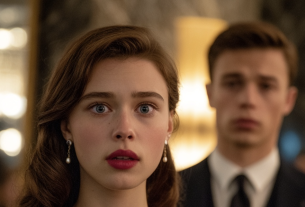Marina sat on the edge of the couch and counted her breaths so she wouldn’t snap.
In the bedroom—a wheeled suitcase; in the hallway—Alexei’s jacket, smelling of someone else’s perfume.
Behind the wall, their son was asleep.
The apartment was breathing silence, like a hospital ward before an operation.
Alexei was carefully folding his shirts, not lifting his eyes.
“You’re silent again,” he threw over his shoulder as he pulled up the zipper. “I was waiting for you to at least ask why.”
“I don’t want to listen to excuses,” Marina replied. “You made all the decisions without me.”
“You could’ve at least tried to stop me.”
“You don’t try to keep garbage,” she said with a sharp smile. “You take it out.”
He flinched.
“Spare me the cheap metaphors. We’re adults. Let’s stay friends.”
“Be friends with your mistress,” she said evenly. “What’s her name again?”
“Don’t call her that,” he snapped. “Lena is a normal person.”
“Normal people don’t lie down in someone else’s bed.”
He closed his eyes for a second, as if letting the blow pass through him.
“I’ll take Ilya on the weekends. And I’ll send money. You know I’m not going to disappear.”
“You’ve already disappeared,” Marina said, watching his hands. “Only the body is left here to finish packing the suitcase.”
Alexei’s phone buzzed on the nightstand. A short message. He drew in a breath, not managing to hide his smile. Marina saw that movement of his lips—too alive for a man who was supposedly just “tired.”
She stood up.
“If you walk out now—you walk out for good. No late-night calls of ‘how are you,’ no sudden visits to ‘check homework.’ You want a clean start? Enjoy.”
“You don’t know how to forgive,” he said quietly. “That’s what will make things worse for you.”
“I’ve already had worse. From here on—only up.”
At the same moment, both of them looked at the cabinet door: there, in a child’s drawing, three people were holding hands—Dad, Mom, Ilya.
Marina took the drawing off and held it out to Alexei. He didn’t take it.
“You’ll tell him yourself,” she said firmly. “And not with ‘we’re different people’ or ‘these things happen.’ Tell him the truth: you found someone else and chose yourself.”
“You’re cruel.”
“And you’re not?”
He picked up the suitcase. The wheels thudded dully over the threshold.
“Marina, if… if it gets too hard—call me.”
“When it’s hard, I call a doctor, not the cause of the illness.”
The door closed. The apartment became lighter and heavier at the same time.
Marina went into the kitchen and turned on the kettle, then turned it off again—the noise irritated her. She picked up her phone. On the screen it flashed: “New card transaction: -120,000.” Joint savings. A week ago. She sat down on the stool and laughed—a hoarse, alien laugh.
“Nice. Very adult,” she whispered to herself.
Behind her, something creaked softly: Ilya was standing in the doorway, rumpled, barefoot.
“Mom? Did Dad leave?”
Marina licked her dry lips and crouched down so she’d be at eye level with him.
“Dad went to live somewhere else. But he loves you. And I love you. And we’ll manage.”
“He won’t come back anymore?” the boy asked, clutching a toy car in his hands.
“He’ll come visit you. But at home it’s you and me now. Whether that’s bad or good—we’ll decide ourselves.”
Ilya hugged her around the neck tightly, like a grown-up. She closed her eyes for three breaths. Let go.
“Go lie down. You’ve got practice in the morning.”
When he left, Marina pulled a shirt out of the laundry basket—he’d forgotten it. A crinkly receipt fell out of the pocket. “Legal consultation. Application: divorce, division of property.” The date—yesterday. Next to it—a business card with a phone number, neatly fastened with a paperclip.
Her phone vibrated again. A message from an unknown number:
“Marina, this is Lena. I understand how unpleasant this is for you. I will respect your boundaries. If Ilya needs anything—write to me.”
Marina deleted the text without opening it and put the phone face down. Inhale. Exhale. She turned the kettle back on—and this time waited for it to start hissing.
“Adult, then adult,” she said aloud. “We’ll start with rules.”
She took out a notebook, drew a thick line and wrote:
“1) Lawyer.
2) Card in my name.
3) Routine for Ilya.”
At the bottom, after a pause, she added:
“4) No more keeping quiet.”
The night sagged like wet laundry on a clothesline, but by morning the room seemed brighter. She got her son ready, they left—and the elevator stopped on the first floor. The doors slid open, and Marina came face to face with a woman in a sky-blue coat, strikingly young. Her lashes cast little shadows. For a moment they both froze.
“Are you Marina?” the woman asked gently. “I’m… Lena. I came to pick up Alexei’s shirt. He… left one here… it was my gift.”
Marina gave a short nod.
“You’ll wait outside. My child is running late.”
“Of course. I… didn’t mean to intrude.”
Marina squeezed her son’s hand tighter and walked past. Outside, the cold street smelled of wet asphalt. Suddenly she understood with perfect clarity: she would never again give up ground to anyone in her own home.
At the school gate Ilya turned back:
“Mom, are you going to smile today?”
She leaned down and kissed the top of his head.
“Yes. Just after I take care of a few things.”
When she came back, Lena was still standing by the entrance, shifting from foot to foot. Marina handed her the shirt tied up in a bag and the stranger’s business card, pinched in the door’s shadow.
“Tell Alexei that next time it goes through the lawyer,” she said calmly. “And no more messages to my number. Ilya has a father. Everything else is not your field.”
Lena went pale and nodded. The door closed softly, almost soundlessly. In the kitchen, the kettle finally switched off by itself.
Marina sat down at the table, opened the notebook and added a fifth point:
“5) Live.”
Marina didn’t remember how the next week went by. Everything blurred together—phone calls, reports, Ilya’s homework, the evening news where someone was always saving someone, but never her.
Only in the mornings, when she put the coffee on, did that same sticky, ringing silence descend for a second—the kind that made you want to scream.
One evening the phone rang.
“Marin, hey, it’s Ira. Are you even alive over there?”
“Sort of.”
“Cut it out with your ‘sort of.’ Let’s go out of town on Saturday, I’ve already planned everything.”
“I can’t, Ilya…”
“You’re bringing him with you. Let him get some fresh air, and you can stop breathing the past.”
Marina smirked, but inside something stirred. She agreed.
On Saturday they drove out to the lake. The air smelled of pine and freedom. Ilya chased a ball around with Ira’s kids, and Marina, for the first time in a long while, just sat there in silence—without the thought of “what next” gnawing at her.
And then she heard a voice:
“Marina?”
She turned—there was a tall man with a beard in a sports jacket, smiling at her.
“Don’t tell me you don’t remember. Anton. Uni, third year, accounting lectures, I always copied from you.”
Marina blinked, and the memories surfaced. That same Anton who once invited her to a concert, but she was already seeing Alexei back then.
“Wow… It’s been a hundred years,” she smiled.
“A hundred years—and one divorce,” he chuckled. “So you’re in the ‘new life club’ too?”
“Looks like it.”
They drank tea from a thermos and talked about everything and nothing. There was no pity in his voice, only lightness. And for the first time, Marina didn’t feel broken.
On the way home, Ilya asked:
“Mom, who was that?”
“An old friend,” she answered.
“He’s nice. You smiled with him.”
The following week Alexei called.
“Marina, could you let Ilya stay with me for two days tomorrow?”
“Yes, of course. He misses you.”
“By the way, who were you with last weekend?” his voice tightened.
“With a friend. Why do you care?”
“It’s just… Ilya mentioned some guy. I don’t want random people around him.”
“Random people? Are you serious, Alexei?”
“You know what I mean.”
“No, I don’t. But I know that a father who left has no right to choose who counts as ‘random’ in our home.”
He went silent.
“You’ve changed,” he said finally.
“Yes, and you don’t like it.”
Anton sometimes texted her. Not obsessively, just short messages:
“How’s your day?”
“Did you get any sleep at all?”
“Don’t forget to eat.”
She caught herself waiting for those lines.
One evening he invited her to an exhibition.
“Not as a date. Just to distract you,” he said.
She hesitated, but agreed.
The gallery was almost empty. Soft light fell on the paintings, which reflected in the glass. Anton stood beside her in silence, then quietly said:
“You hold yourself like everything is under control. But your eyes give you away—you’re tired of being strong.”
Marina turned away.
“I just don’t want pity.”
“And I’m not pitying you. I’m admiring you.”
Her heart twanged like a string. She didn’t answer, just took a deep breath.
On the way home that night, she realized that for the first time in a long while she didn’t want to check her phone—she wasn’t waiting for Alexei’s call.
But the call came anyway. Late at night.
“Are you asleep?” his voice was hoarse.
“Why do you care?”
“I just… miss you. Lena left. It’s complicated.”
Marina snorted.
“Complicated? Was it simple when you were walking out?”
“I made a mistake.”
“No, Alexei. You made a choice. The mistake would be if I believed you.”
He fell silent, as if he hadn’t expected such firmness.
“Marin, I…”
“Don’t go on. We both know you don’t miss me. You miss how I made your life convenient.”
She hung up and stared at the screen until it went dark.
Then she got up, poured herself some water and looked out the window.
At the reflection—a woman with a straight back and calm eyes.
And for the first time she thought, “You know… I think I’m starting to like myself again.”
A month passed. Spring. The air smelled of young leaves and something new—not here yet, but already promised.
Marina walked down the street and felt how everything around her was gradually moving into motion: cars, wind, birds, and she herself.
Work went on in its usual rhythm. Evenings—school, dinner, cartoons with Ilya. Sometimes—meetings with Anton. Without big declarations, without promises. Just there.
Sometimes he brought books, sometimes pastries, sometimes he just sat quietly with her in the kitchen while the city hummed outside the window.
And in that silence there was more support than in dozens of “hang in there”s she’d heard before from everyone.
One evening she was coming home with groceries. On the landing of the first floor, Alexei was standing there. Sober, neat, but somehow lost.
“Marin, can I have a minute?”
She stopped, but didn’t move closer.
“Say it.”
“I… wanted to apologize. For everything. For that night, for the way I left. I know it’s late, but…”
“Yes, it’s late,” she answered calmly. “But thank you for finally understanding.”
He nodded, dropped his gaze.
“I can see you’ve changed. Strong. Free.”
“No,” Marina smiled. “I just stopped being convenient.”
Alexei gave a small, crooked smile in return.
“I’m glad you’re doing well. Take care of yourself.”
She nodded.
When he left, Marina felt something strange: not pain, not anger—lightness. Everything had finally fallen into place.
A week later there was a school concert—Ilya was singing.
Marina sat in the audience with her phone ready. Her heart was pounding with pride: he stood there confidently, singing loudly, looking straight into the hall.
In the front row, Anton was holding a bouquet. When the concert ended, he handed the flowers to Ilya, then turned to Marina.
“For him,” he said, smiling.
“And maybe a little for me?” she teased.
“A little,” he replied.
Ilya stood between them, happy, with flowers and a chocolate bar.
“Can Anton come with us for pizza?” he asked.
“Only if you invite him yourself,” Marina said.
“Anton, will you come?” the boy asked hopefully.
“If your mom doesn’t mind,” he smiled gently.
“I’m actually in favor,” said Marina.
Later, when Ilya was asleep, they sat out on the balcony with cups of tea. The city glittered with lights, and the rain softly rustled against the windowsill.
“You know,” Anton said, “I’ve never seen anyone rebuild their life after a storm so calmly.”
Marina looked at him.
“It’s just that at some point I realized: if the hurricane’s passed, you don’t sit around waiting for the next one. You open the windows and let the air in.”
He smiled.
“Can I stay in this house as the fresh air?”
She laughed.
“As long as you don’t blow too hard.”
He gently took her hand. No promises. Just warmth.
For the first time in a long while, she wasn’t thinking about the past. She wasn’t comparing. She wasn’t analyzing. She just sat, listening to the rain tapping, and felt—her heart was alive again.
A few days later she found her old notebook. The one where she’d once written:
Lawyer
Card in my name
Routine for Ilya
No more keeping quiet
Live
She crossed out the last line and added a sixth:
Love. Without fear. Without “if.”
Marina closed the notebook and put it on the shelf.
Life had finally stopped being a fight—it had become a choice.
And that choice was hers



